By Gina Monaco
We’re living in a time of unprecedented connection –notifications ping constantly, information is consumed in seconds, and life moves at a pace faster than ever before. During this digital whirlwind, music has not only remained relevant, but it has also become even more essential.
As working musicians, we have all seen firsthand how music anchors people in moments of chaos, bridges emotional gaps across cultures, and offers something increasingly rare in the digital age: human connection.
Here’s why I believe music matters now more than ever.
1. Music Cuts Through the Noise
The Internet is loud. Social media platforms, video feeds, emails, news alerts — each demands our attention. But music? It doesn’t ask for your time in the same way. It offers it.
Whether it’s a quiet instrumental track during your workday, a nostalgic song that brings you back to childhood, or a late-night playlist that speaks to how you’re feeling, music connects deeply, quietly, and personally. It bypasses algorithms and speaks directly to emotion.
In an age of endless scrolls, music invites us to pause — and feel.
2. It’s One of the Last Shared Human Experiences
We’re more digitally connected than ever, yet many of us feel more isolated. Live concerts, jam sessions, even singing along with others in a car — these are still some of the most meaningful, collective human experiences we have.
Music creates a sense of belonging. Whether it’s an anthem at a protest, a local band playing at a community event, or a viral hit uniting fans across continents, music builds invisible bridges between strangers. No translation needed — just rhythm, melody, and shared emotion.
In divided times, music reminds us of what we have in common.
3. It Helps Us Process Our Emotions
We all carry stress. Some of it is surface-level — deadlines, commutes, messages left unread. Some of it runs deeper — grief, loneliness, change. Music doesn’t erase these feelings, but it helps us move through them.
Songs let us feel seen when we can’t find the right words. They hold space for joy and sorrow alike. They validate our struggles and celebrate our victories.
Think about how many times you’ve turned to music not just for entertainment, but for healing. In a world full of instant fixes, music offers emotional honesty.
4. It’s One of the Most Democratic Art Forms
Thanks to technology, music has become more accessible than ever. Anyone with a smartphone and internet connection can listen, learn, or even produce their own tracks. Music isn’t confined to elite spaces or gatekeepers anymore. It’s global, grassroots, and growing.
This democratization means more voices are being heard — artists from marginalized communities, genres from remote corners of the world, and collaborations that would have been impossible a decade ago. Music today is more diverse, inclusive, and reflective of the real world than at any point in history.
And that matters because representation in art shapes how we see ourselves and each other.
5. It’s a Form of Resilience
Look back at any global crisis — wars, pandemics, civil rights movements and you’ll find that music was never far behind. It has always been a way for people to document history, process trauma, resist oppression, and find hope.
Even during the COVID-19 lockdowns, what did we turn to? Online concerts, balcony performances, collaborative music videos. Music helped us feel less alone when physical connection wasn’t possible.
In the digital age, music continues to offer emotional resilience. It gives us language for what we’re experiencing, and strength to keep going.
More Than Background Noise
In today’s world, where AI curates your feed and productivity often overshadows creativity, music remains a deeply human art form. It doesn’t just entertain. It transforms. It tells stories that algorithms can’t. It reaches places data can’t touch.
As musicians, we’re not just playing notes, we’re contributing to something timeless, emotional, and powerfully human. And I believe we all benefit from keeping music at the center of our lives, especially now.
So, whether you’re creating, listening, or sharing, thank you for making space for music.
Because in the digital age, it might just be the most analog thing that still holds us together.
Let’s keep the conversation going..
Has music helped you through a tough time or brought people together in your life or work? We’d love to hear your story in the comments.
Gina Monaco is a former journalist and editor who now spends her time writing and blogging and as the vocalist for The Enablers, a multi-genre, but mostly classic, rock band.
